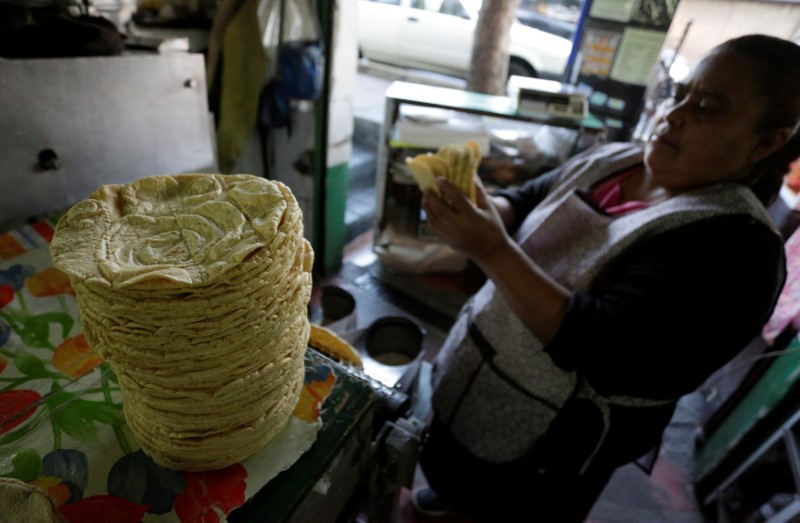 © Reuters. Woman arranges a stack of freshly made corn tortillas at a tortilla factory in Mexico City
© Reuters. Woman arranges a stack of freshly made corn tortillas at a tortilla factory in Mexico CityBy Diego Oré and David Alire Garcia
MEXICO CITY (Reuters) – Mexico’s government on Wednesday denounced forecast price hikes by fuel retailers and tortilla makers, saying increases were unjustified as it sought to allay public concern about high inflation at the start of a presidential election year.
Prices for corn tortillas, the Mexican staple, are forecast to rise in the coming days by between nearly 11 and 21 percent, according to figures from the National Union of Industrial Mills and Tortillas.
Meanwhile, gasoline and diesel prices are seen by one retail association rising an average of about 7 percent this year due to tax changes, volatility of the peso currency and higher crude prices.
“That they say they are now going to hike prices is unjustified. We don’t see the market conditions for this to happen,” said Jose Rogelio Garza, a deputy economy minister.
The forecast from the Mexican Association of Gasoline Businesses (AMEGAS) was quickly dismissed as false in a statement by state-run oil company Pemex, but that did not stop complaints.
“My suppliers bring me the dough by car and if gasoline prices go up then obviously they are going to have to adjust their prices,” said Jorge Garcia, the owner of a Mexico City bakery.
The price of liquefied , used for cooking, rose by an average of 25 percent in 2017, while electricity rates have also inched up, according to government data.
“With increasing gas prices we’re going to have to make adjustments… I can’t work without gas,” said Garcia.
As inflation hovers near a 16-year high at just below 7 percent, officials insisted the forecast price spikes, which have triggered social media outrage and threats of protests, are not warranted.
“In 2018, variations in international fuel prices will continue to be cushioned,” the finance ministry said in a statement on Tuesday, emphasizing a scheme that allows it to reduce a key excise tax applied to fuel sales.
With presidential elections looming in July, the government is especially sensitive to the possibility that protests could further erode its support among voters.
But beyond rhetoric, the government is mostly powerless to force the hands of gas station owners as its ability to set prices ended in late November after it finalized a gradual, nationwide fuel liberalization.
The move to market prices, part of sweeping 2013-2014 energy reform, ending a transitional period during which it still set maximum gasoline and diesel prices.
The fuel regulator, or CRE, said in a statement that prices in central Mexico for Pemex’s Magna gasoline, which makes up more than 80 percent of total sales, have only risen 1.3 percent compared to average prices at the end of November, an increase it described as stable.
The CRE reported that the average nationwide price on Tuesday for Magna stood at 16.13 pesos per liter.
That works out to about $3.15 per gallon at the current exchange rate.
For many years prior to the passage of the energy reform, fuel prices in Mexico were set by the government and were the same across the country.
($1 = 19.3710 Mexican pesos)
Source: Investing.com




























